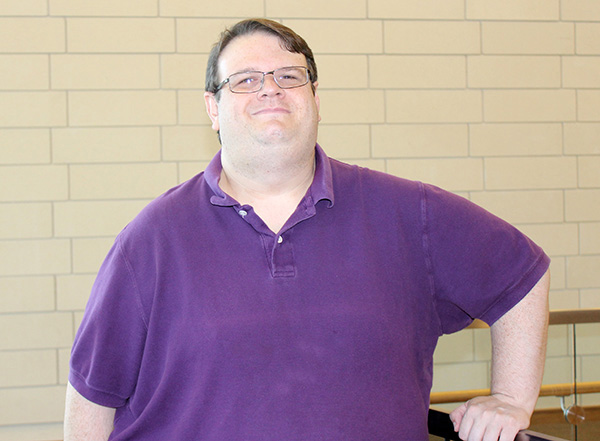Finding Greatness: Dr. Chris Lawrence
Author: News Bureau
Posted: Monday, June 3, 2019 12:00 AM
Categories:
College of Arts and Sciences | Pressroom | Finding Greatness | Faculty/Staff
Macon, GA

Dr. Chris Lawrence played a key role in developing Middle Georgia State’s new Bachelor of Science in Political Science and is the ‘campus champion’ behind efforts to lower the cost of textbooks and other course materials for students.
Full Name: Dr. Christopher N. Lawrence.
Titles: Associate Professor of Political Science and Assistant Chair, Department of History and Political Science (until June 30th); Chair, Department of Political Science (starting July 1).
Degrees: Bachelor of Arts in Political Science (with a minor in Computer Science) from the University of Memphis; Doctor of Philosophy (Ph.D.) in Political Science from the University of Mississippi.
Describe your service to Middle Georgia State University and the community.
“Since coming to Middle Georgia State, my biggest focus has been on working with colleagues to establish a four-year degree in political science for our students, as part of the bigger project of moving from being a state college to a more comprehensive state university. Last year the Board of Regents approved the political science degree; we began enrolling new and transfer students in the program last fall and we expect our first students to finish next spring, with larger groups of students to follow in subsequent years.
“I’ve also become very active in the promotion of our faculty adopting Open Educational Resources as the ‘campus champion’ for the University System’s Affordable Learning Georgia project, working with librarian Dana Casper, with the goal of lowering students’ out-of-pocket costs for textbooks and other course materials. In the past few years our students have collectively saved hundreds of thousands of dollars by using OERs and other low and no-cost materials in their classes.
“Finally, I’ve become part of the University’s civic engagement efforts, building on Dr. Julie Lester’s work as part of the American Democracy Project and joining the ALL IN Campus Democracy Challenge to help promote greater political participation, including voter registration and turnout, among our students, staff, and faculty. We earned a ‘bronze seal’ for our students’ voter turnout in 2016; we’re currently waiting to see how well we did in 2018 and plan to organize more events over the next year leading up to the 2020 presidential primary and general elections.”
What attracted you to a faculty position at Middle Georgia State University?
“One of the main reasons I was interested in coming to what is now Middle Georgia State was that it combines a lot of the benefits of a larger university with the opportunity to teach smaller classes and get to know our students; I’d taught before at schools where the typical introductory American government course had between 50 and 200 students in the class, which meant it was hard to help individual students who might be struggling or to make as many of the connections that lead students to take more classes in our field. “I also knew Dr. Brooke Miller from our time in graduate school at Ole Miss and had already gotten to know Dr. Lester from grading AP exams and academic conferences, and knew Dr. Tom Ellington at Wesleyan, so I knew I already had some friends in my new workplace and community.”
What do you like best about teaching at Middle Georgia State?
“The University has a warm, supportive environment for everyone, where people are willing to go the extra mile for students and colleagues alike.”
In your opinion, what does it take for students majoring in your discipline to be successful these days?
I think the most important thing, whether you’re majoring in political science or some other field, is to have a structure and a plan for success. To be successful inside the classroom you need to set aside the time outside of class that’s necessary to do homework, whether that’s reading assignments or projects or papers, and to the extent possible try to arrange your life so you can avoid distractions and interruptions during that time. Don’t be afraid to ask questions, or to come to see your professors during their office hours.”
What would students be surprised to learn about you?
“My dad was a navigator in the U.S. Air Force until he retired when I was 15, so I grew up as a ‘military brat’ and spent seven years of my childhood in England. I actually started out in college planning to study mathematics and computer science, but I’d always been interested in politics and government and eventually decided that was my calling - although, as it turns out, I ended up using a lot of the skills I learned in my math and computer science classes as a political scientist, both in graduate school and my subsequent research.”
